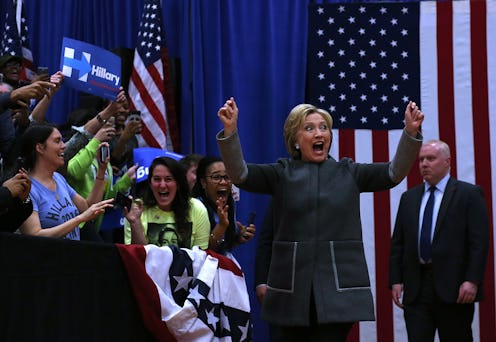News
Super Tuesday 2016 Will Change The Race
Super Tuesday is here, and it's crunch time for presidential candidates who hope to get as many votes — and delegates — as they can. With 14 primaries and caucuses taking place, 595 delegates at stake for GOP candidates, and 1,004 at stake for Democrats, it's sure to be an important primary for all of the candidates. So how is the 2016 Super Tuesday different from 2012?
The states voting during this year's Super Tuesday are different than in 2012. This year's participating states and territories will include Alabama, American Samoa (for Democrats), Arkansas, Colorado, Georgia, Massachusetts, Minnesota, North Dakota (for Republicans), Oklahoma, Tennessee, Texas, Vermont, Virginia, and Wyoming (for Republicans). Idaho — which used to be a Super Tuesday state — changed its 2016 caucus to March 8 for the GOP, and March 22 for Democrats.
According to an NPR report, Super Tuesday was created to elect a moderate candidate. Although this may have been the case in the 2012 elections, when Mitt Romney and Barack Obama secured their spots, this is most definitely not the case in 2016. The GOP frontrunner is a reality-star and businessman, and on the Democratic side, a moderate Hillary Clinton is head-to-head with a radical socialist Bernie Sanders.
In 2012, Mitt Romney was able to secure his spot as the GOP presidential candidate after Super Tuesday, which will not be the case this year especially considering that Donald Trump is at an immense lead next to his Republican rivals. Super Tuesday is one of the last events of the presidential election cycle for GOP candidates to win delegates at a rate that's proportional to their voter percentage rate. After March 15, the remaining primaries and caucuses will award delegates on a winner-take-all basis. Based on that alone, it's likely that the GOP race will be heating up for the remaining candidates to catch up and beat Donald Trump.
Clinton and Sanders have been running closely so far throughout the 2016 Democratic primaries, although Clinton just took South Carolina, which could affect how people vote on Tuesday. One of the big differences between the 2012 and 2016 Super Tuesday primaries is the fact that the Democratic nominee is still unknown to us. In 2012, the Democratic Super Tuesday primaries were uncontested and Barack Obama took his campaign to the general election.
There is a lot at stake on both sides during this year's Super Tuesday and it is sure to be the nail-biting event of the 2016 primaries.
Believe it or not, both primaries and caucuses can be laugh-out-loud hilarious. Don't believe us? Have a listen to Bustle's "The Chat Room" podcast...
